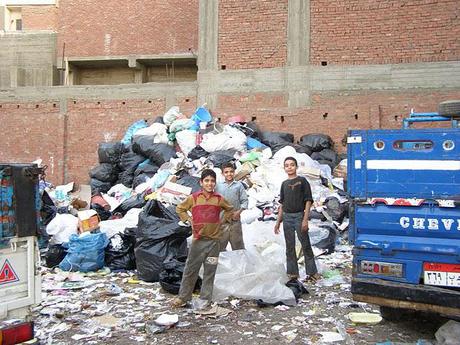
Zabbaleen boys in Mokattam Village in 2009. (Photo: Wikipedia)
“The law is not feeding me.” That was the quote that really caught my eye. At CIPE we talk about “Democracy that Delivers,” but I have never seen such a fundamentally honest and genuine expression of the concept – a democracy will not work unless it is delivering in tangible ways for its citizens.
“The law is not feeding me.”
The source was a black market pig farmer quoted in a fascinating article on a garbage collection crisis in Egypt in Monday’s Washington Post. (And no, I didn’t know there was such a thing as a black market pig farmer, either.) It seems that pigs raised by Cairo’s Coptic Christian Zabbaleen community used to consume a significant portion of the city’s garbage. Reacting to the global swine flu epidemic in 2009, the Egyptian government slaughtered all of the country’s pigs and, from then on, banned ownership of trash-fed pigs. This usurped the livelihood of the Zabbaleen – and resulted in a city-wide backlog of unconsumed, uncollected garbage. To make matters worse, in the current economy, government-contracted sanitation firms are being short-changed by a full half of their fees and have had to cut back service accordingly.
The whole situation reminds me of a Bert and Ernie sketch I remember from watching Sesame Street as a kid. Ernie is trying to put a cooking pot on Bert’s head, and Bert gets frustrated and demands to know why. Ernie explains that he broke the cookie jar, and had to find someplace to put the cookies. The cookies went into the sugar bowl, the sugar into a flower pot, the flower into a milk bottle, the milk into a soda bottle, the soda into the fishbowl, and the fish into Bert’s cowboy hat. Bert exclaims, “What am I going to wear to play cowboy?” at which point Ernie puts the cooking pot on Bert’s head and says, “Ride ‘em cowboy, Bert!”
(Sesame Street copyright by Children’s Television Workshop, fair use under Section 107 Copyright Act 1976.)
The whole bad, to worse, to ridiculous string of chaotic events in the sketch disturbed me as a kid, which I think is why it stuck with me all these years. (I’ll be honest: I was a pretty uptight little kid, and could relate to Bert here more than to Ernie.) But looking back at it, it’s a funny little parable of unintended consequences.
The Egypt story would be funny, too, if it weren’t for the very real impact on Zabbaleen families, and on public health in Cairo. It remains, however, a useful cautionary tale of the dangers of unintended consequences in public policy. In a game of public policy Whac-a-Mole, a law intended to serve public health by eradicating swine flu wound up threatening public health with a waste management crisis.
It’s also a good example of what happens when laws and regulations are made without any consultation with the people they will impact, and as a result, don’t function for the people they’re intended to serve.
Some of the Zabbaleen have moved on to other trades. Others, however, with no other skills or opportunities, have been forced into the informal sector, resorting to buying garbage-fed pigs on the black market and raising them clandestinely, hoping the authorities won’t catch on.
One such farmer said he is “doing this for [his] children.” And he went on to deliver that powerful line: “The law is not feeding me.”
More than just selecting leaders at election time, a democracy must deliver for its people in order to function and thrive. Egypt this year held the first truly democratic presidential elections in its history, and the winner, President Mohammed Morsi, has quickly worked to consolidate and exercise the reins of power. Still, the country is holding its breath, awaiting the results of the work of the Constituent Assembly on the country’s new constitution, which will lay out the nature, structure, and function of Egypt’s new democracy. Regardless of the outcome of those deliberations – a presidential or a parliamentary system; secular, guided by, or even strictly following Sharia law – Egypt’s new system must deliver in tangible ways for the millions of frustrated young people and other citizens who merely want the freedom and opportunity to put food on the table for their families.
One way to make sure this happens is to establish processes and institutions that encourage citizen participation in, and feedback on, the decisions being made on their behalf. So when the government decides to tackle the garbage problem, not only government experts are consulted, but public health and public works professionals in the private sector, community groups in the affected areas, sanitation firms, sanitation workers, and yes, even Zabbaleen pig farmers. With channels of two-way communication open between the government and the governed, policymakers will have full information about people’s needs, and on the trade-offs and potential consequences of a given course of action.
A democracy that is open, inclusive, and participatory has a much better chance of settling on informed policies that deliver for its people.

